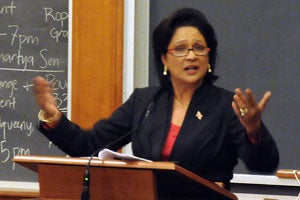Harvard Law School welcomed Kamla Persad-Bissessar, the Prime Minster of Trinidad and Tobago this month for a lecture on leadership and cooperation. Persad-Bissessar became the first female prime minister of the Caribbean nation in May, and was named one of the top 10 female world leaders by TIME Magazine in August.
The event, sponsored by the Program on Negotiation at HLS, the Institute of Politics at the Harvard Kennedy School, and the Harvard International Negotiation Program, focused on the importance of inclusiveness and fairness in politics.
Director of Harvard International Negotiation Initiative Daniel Shapiro introduced Persad-Bissessar by giving his impression of her from when they once worked together on a negotiation.
“I was inspired by your openness to listen, your openness to understanding diverging perspectives, and your openness to really working to serve the people,” he said.
As a leader of a five-party coalition, Persad-Bissessar said the challenge facing leaders today is to construct a framework of ideas aiming to achieve mutually agreed goals between people of different opinions. She also spoke about the “paradigm shift” in governance today—people are moving away from authoritarianism and beginning to instead view themselves as employers of the government.
“In today’s world, an enlightened citizenry, empowered by global communications, is not prepared to be dictated to,” she said. “They want to contribute in a meaningful way to craft their future. Therefore, dialogue is important.”
Persad-Bissessar attributed her electoral success to three principles inspired by Mahatma Gandhi: force of character, personal conviction, and prayer.
“If we put God in front, and walk behind, we cannot go wrong… remember that the voice of the people is the voice of God. Therefore, in order to lead, we must listen first to the voice of the people, and we will be walking behind God,” she said.
Her party’s commitment to a “people-centered development” which requires “wide stakeholder consultation and consensus-building in decision-making” is manifest in the creation of the Ministry of the People, aimed at improving responsiveness of the government to the needs of the poor. She said the most powerful leaders are “servant leaders.”
“My mantra for members of my government has always been… three priorities: priority one, serve the people; priority two, serve the people; priority three, serve the people.”
Inclusiveness is also crucial to the governance of the multicultural twin island nation. Given its small size, Trinidad and Tobago “cannot afford to exclude talent simply because ethnicity or simply because of political party affiliation,”said Persad-Bissessar.
“My success depended on convincing the population that I subscribe to a set of principles and values which transcended race, religion and culture,” she added. In times of urgent need, she said, there may be temptation to use the end to justify the means, but sustainable leadership requires a “moral compass,” commitment to transparency, and flourishing of democracy.
“We cannot build this administration unless we build it on a rock solid foundation of integrity… Successful nations today will only be built through the channeling of intellectual power to meaningful ends. Democracy and the spirit of cooperation are the only channels through which this can be accomplished.”
